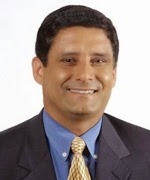WKYT anchor Sam Dick finishes radiation treatment for recurring prostate cancer; encourages others to monitor their health

 |
| Photo from www.mediabistro.com |
Longtime WKYT-TV anchor Sam Dick believed that his battle with prostate cancer was over, but found out six months ago that some of the cancer remained. He reported on his diagnosis and treatment as he neared the end of a seven-week course of radiation.
“Being told you have cancer is life-changing,” Dick said. “Three and a half years ago, many of you followed my journey fighting prostate cancer and were very supportive as I decided to have surgery to remove the prostate. I was told by doctors at the time, I was cured.”
But six months ago his prostate specific antigen levels, which had stayed undetectable for two years after his prostate was removed, crept up, so he started daily treatments at Lexington Clinic‘s John D. Cronin Cancer Center. PSA levels can vary widely and can be unreliable, but are the best diagnostic tool available. “In my case, a rising number means cancer is likely still present,” he explained. Dick’s treatment was tailored to his medical condition and cancer history.
Dick has maintained his regular schedule of anchoring WKYT’s evening newscasts and had told only a handful of people about the cancer’s recurrence, but as he approached his last radiation treatment he said he wanted to remind others about the importance of watching for warning signs.
“We can’t see the cancer cells in a situation when we’re treating for a rising PSA after surgery, but we know where we need to treat because there is an overwhelming likelihood that the reason that the PSA is going up is because there is residual disease in the pelvis so that’s our target,” Dr. Janalyn Prows, a radiation oncologist, said in the WKYT report.
“It’s not uncommon for men who’ve had their prostate removed because of cancer to find out years later some cancer” remains, but it’s not what I expected, or centrality wanted,” Dick said.
His father, journalist and author David Dick, battled prostate cancer for more than a decade before dying of it a few years ago. He referred to that and said, “I feel blessed. They had nothing like this available. The advances of medical technology are a blessing I’m taking advantage of, and I’m hopeful and optimistic it’s going to work.”
Dick will have his follow up PSA in two months. “At that time, we’ll see where I am,” Dick said. “Until then, I appreciate all the emails, Facebook posts, and notes of support and prayers. Thank you from the bottom of my heart!”
Prostate cancer is the second most common cancer among men after skin cancer, according to the American Cancer Society. For more information about it, click here.